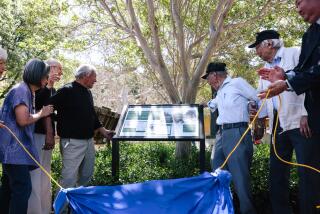Reunion invitation conjures up a ‘slew of memories’ for former prisoner of war
- Share via
Juaquin Miguel Barrasa--Mike to his buddies--meets a group of retired seamen at a San Pedro restaurant every morning to sip coffee and talk about old times and distant travels.
Maybe it’s seeing the red and gold Asian decor at the Canton Cafe or watching the Chinese employees greet customers and pour coffee, but these days their daily conversations take an inevitable turn toward the Far East, to Shanghai and the World War II camps where Japanese soldiers kept British and American prisoners.
That’s when Mike Barrasa starts talking.
Barrasa, a retired merchant mariner, was imprisoned at the Lung Hwa prison camp near Shanghai for nearly four years, practically the entire period of U.S. involvement in World War II. Now 67, he is planning to attend a prisoner-of-war reunion in London next month. The invitation from a group of British women also detained at Lung Hwa has conjured up a “slew of memories,” said Barrasa, and prompted him to dig out a red armband he had to wear to help the Japanese soldiers distinguish British and American civilians.
Barrasa was a 21-year-old boiler-room worker on the President Harrison, an empty passenger liner that was on its way to pick up American troops stationed in Shanghai. The day after Pearl Harbor was attacked, the captain ran the ship aground off the Chinese coast to prevent the Japanese from using it. Four of the 160 crew members died as they attempted to reach the shore and the rest were captured, taken to Shanghai and eventually placed in several impromptu civilian internment camps that were opened by the Japanese in factories and schools, he said.
Most of the prisoners at the camps were British civilians who had been living and working in Shanghai. Of the 1,700 prisoners at Lung Hwa, only about 25 were Americans, including Barrasa and Hank Behrens of Rancho Palos Verdes. Behrens, who is on a Merchant Marine ship in the Orient, could not be reached for comment, but his wife June said she and her husband plan to attend the Lung Hwa reunion.
Barrasa relates his experience with the excitement of a child describing a summer camp adventure.
“We would do things to keep our sanity--you know, like sneak out to a little farm outside the camp and trade clothing for cigarettes and stuff,” Barrasa said. “Or one time I remember this nurse . . . took some skeins of yarn I had kept aside from a Red Cross package and traded it in for cigarettes for me. There are all kinds of interesting stories from that place.”
Apparently one of Hollywood’s top producers agrees. Steven Spielberg, director of high-grossing films such as “E. T.,” “Jaws” and “Raiders of the Lost Ark,” is making a film about Lung Hwa war prisoners called “Empire of the Sun,” said a Warner Brothers spokeswoman. The film, which is based on a novel of the same name by J. G. Ballard, is being filmed in London and Shanghai, the spokeswoman said.
“I am glad somebody is making a movie, though I hope they stick to the truth and don’t go overboard,” Barrasa said. “I hope they have talked to a lot of people that were there so they get the real picture. I was just a kid when I was taken prisoner by the Japanese, but I can remember some things like it was yesterday instead of 45 years ago.”
Surprisingly, Barrasa’s memories of his detainment are largely fond ones.
“Maybe I can take more because I have always had an adventurous streak in me, but the prison camp was not all that bad,” he said.
Barrasa, who keeps in touch with Behrens and a few other former prisoners in California, said he spent most of his time in the prison camp “working in the kitchen and dreaming about a decent meal.”
“The food was horrible, but we couldn’t really expect them to run out and find us pot roast or something like that,” said Barrasa, whose diet consisted mostly of rice and watery meat and fish stews. “I just hope they have better food at this reunion.”
Though smaller reunions have been held in Britain and the United States, the coming event will be the first time civilian war prisoners from both countries will get together. Organizers expect as many as 500 to attend.
“People think that this is something that we would all rather forget about but that is not true,” Barrasa said. “If we forget about it, how can we expect people to remember it in the future? I think we must have learned something from that war camp. I am not sure what, but whatever it was it was too important to forget.”
More to Read
Sign up for Essential California
The most important California stories and recommendations in your inbox every morning.
You may occasionally receive promotional content from the Los Angeles Times.













